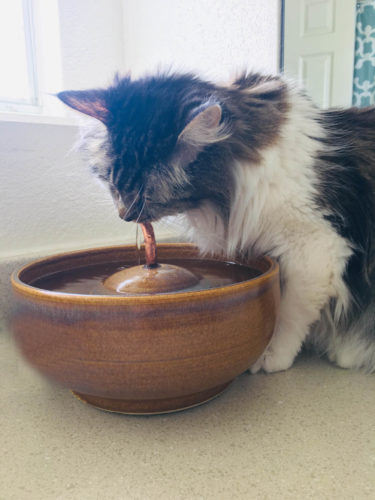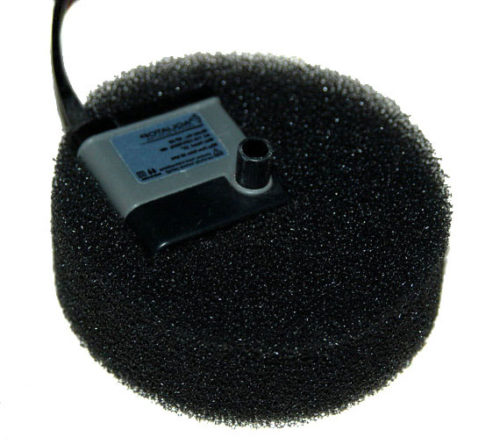Is Bottled, Distilled, Chlorinated Or Filtered Water Best For Cats?
We naturally think that by providing our cats with the purest water available we are doing the very best possible thing in helping our cats to stay healthy. That is, healthful water = healthy cats. The premise is sound – if we can keep the water healthful the cats will benefit. However, there are a lot of caveats and some controversy over this matter. Here we’ll try to sort it out.
Home water filters, of which there are a great many, including Reverse Osmosis systems, filter out a wide variety of elements including minerals as well as organic compounds, bacteria and chlorine. (More on this further down.) Each brand of filter targets a specific set of components to filter out.
Ordinary bottled water can be but usually isn’t contaminated and any water from a plastic container has the issue of microplastics, including distilled water, which has no minerals and zero chlorine.
Is Water With Minerals and Chlorine Best For Cats?
So what about minerals and chlorine? Minerals are good for your cats but they should be getting those from their food. And chlorine? Consider this: The greatest problems with your cats’ water often doesn’t come from the water, it comes from the cat. Your cat eats his food, licks his fur, his paws, his tail and every other part of his body, then goes to have a drink from his water source. Every living bacteria on his tongue gets into the water. Chlorine goes a long way to neutralize those bacteria. Chlorine reduces the threat of nearly all types of waterborne microorganisms. That is why it is used in drinking water. It helps purify the water and greatly reduces the harmful microorganisms that can live there. Please note – Covid-19 is not transmitted via water. Other viruses may be.
Do RO Systems Provide Water Best For Cats?
Filtered water or water run through a Reverse Osmosis system is particularly good for Us. We fill a glass and drink it. For our cats, however, the water remains in the bowl for often, days, and chlorine helps keep the water safe. Filtration systems are good and if you have one installed at the sink you fill your cats’ fountain from you may want to add a little chlorinated water to it from another tap. So, if you have a good water source at your tap including good city water, and you drink from it, it should be fine for your cats too. If there is too much chlorine, a carbon filter will help. See below.

Besides providing beneficial water, there is more that we can do to make our cats’ drinking experience healthful. The first of course, recommended by Veterinarians around the globe, is to use a cat fountain. But not a plastic fountain.
Fountains Promote Hydration
Nothing so encourages a cat to stay healthfully hydrated like a fountain, and especially a ceramic fountain which does not become scratched or harbor bacteria or have biofilm buildup as do the plastic brands.
The reason cats are so attracted to fountains is that in nature only moving water is safe. Stagnant water harbors all manner of potentially deadly bacteria and cats, still being very much ‘in the wild’, are instinctively aware of this. This is why so many cats stir their water or push their water bowl. They want to see the water moving. This is also why they drink from the toilet which often shows moving water or want the tap turned on and this is why so many vets and cat owners testify to how much better their cats are hydrated when they are given a fountain. It gives them clearly, audibly moving water, which is in fact, fresher as well as it recirculates and oxygenates.
Activated Charcoal Can be Beneficial
Another way to help improve the quality of cats’ drinking water is to use activated charcoal, offered in various filter mediums for most cat fountains. Activated charcoal, or carbon, can interact with and absorb a range of toxins, drugs, viruses, bacteria, fungus, and chemicals found in water and improve taste and remove odors. It does not remove minerals, salts or dissolved inorganic compounds. It is used in emergency rooms of both hospitals and veterinarian clinics for the purpose of detoxifying. Even ingested it has no negative side effects and can be very beneficial in removing a wide range of toxins.
Whether or not you need a carbon filter for your cat depends on your situation; the nature of your cat, his habits, how many cats you have, his water and how often you change it. Many households with a single, tidy cat don’t need carbon filters. Many others would benefit from using them. If your cat turns away from his fountain soon after cleaning and refilling, there is a good chance you need a carbon filter. Carbon also removes the unpleasant aroma and taste of chlorine.
Foam Pre Filter
 Another device that can help keep your water healthful and provide water best for cats is a pre-filter or sponge or foam filter and most cat fountains provide this in one form or another. This prevents solid matter such as cat hair or food particles from entering the pump and recirculating into the water. When the filter is rinsed thoroughly that organic matter is removed from the system without ever having become much of an active part of it. From ThirstyCats, a foam filter is included with every fountain while the carbon filters are optional. They last at least a year and often longer. Other brands last much less time, usually around three weeks.
Another device that can help keep your water healthful and provide water best for cats is a pre-filter or sponge or foam filter and most cat fountains provide this in one form or another. This prevents solid matter such as cat hair or food particles from entering the pump and recirculating into the water. When the filter is rinsed thoroughly that organic matter is removed from the system without ever having become much of an active part of it. From ThirstyCats, a foam filter is included with every fountain while the carbon filters are optional. They last at least a year and often longer. Other brands last much less time, usually around three weeks.
Antimicrobial Copper
And finally there are the antimicrobial copper components of ThirstyCat fountains. These are included in all of our bubble-up fountains and can be included in most of our tower type at no extra charge. In addition, we make both a Serenity Flow and the Downflow (shown here) to fit any bubble-up fountain. These provide the benefits of copper and produce a satisfying stream.
It has been demonstrated clearly in many scientific studies conducted over several decades that copper has rapid, broad spectrum antimicrobial efficacy against some of the most toxic species of bacteria, fungi and viruses. In other words, copper actively gets rid of bad things in the water.
Your cats’ water source is possibly the most important part of their digestive hygiene. Healthful water, a ceramic cat fountain, possibly a carbon filter and a sponge filter will all contribute enormously to your cats’ health.
